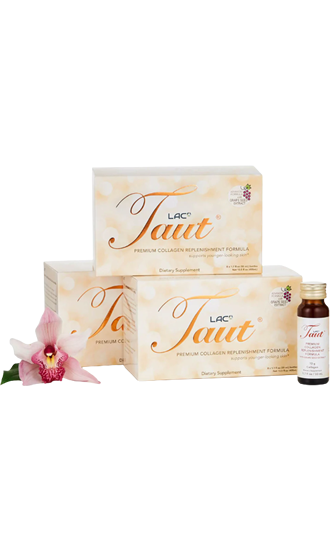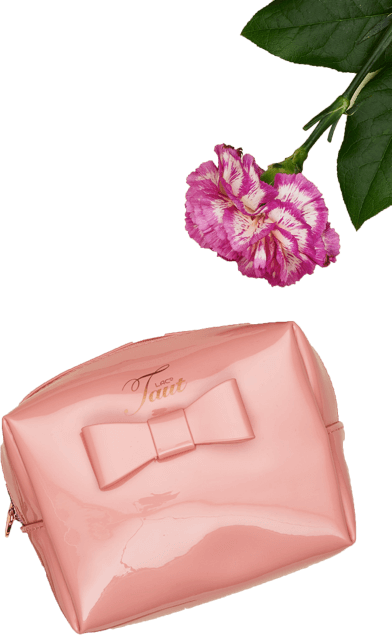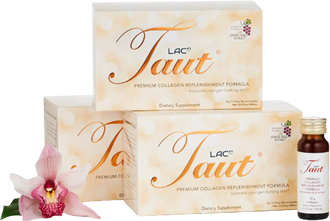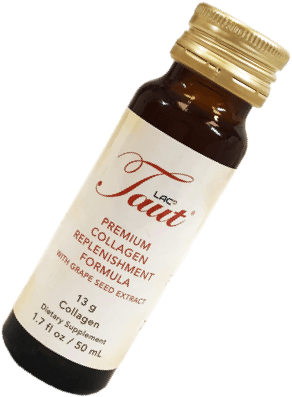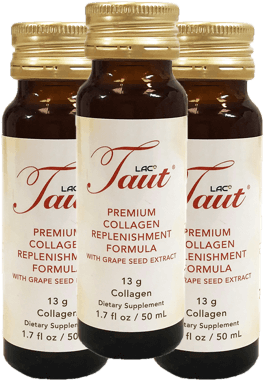What Is Hyperpigmentation: What’s the Meaning & What Causes It?
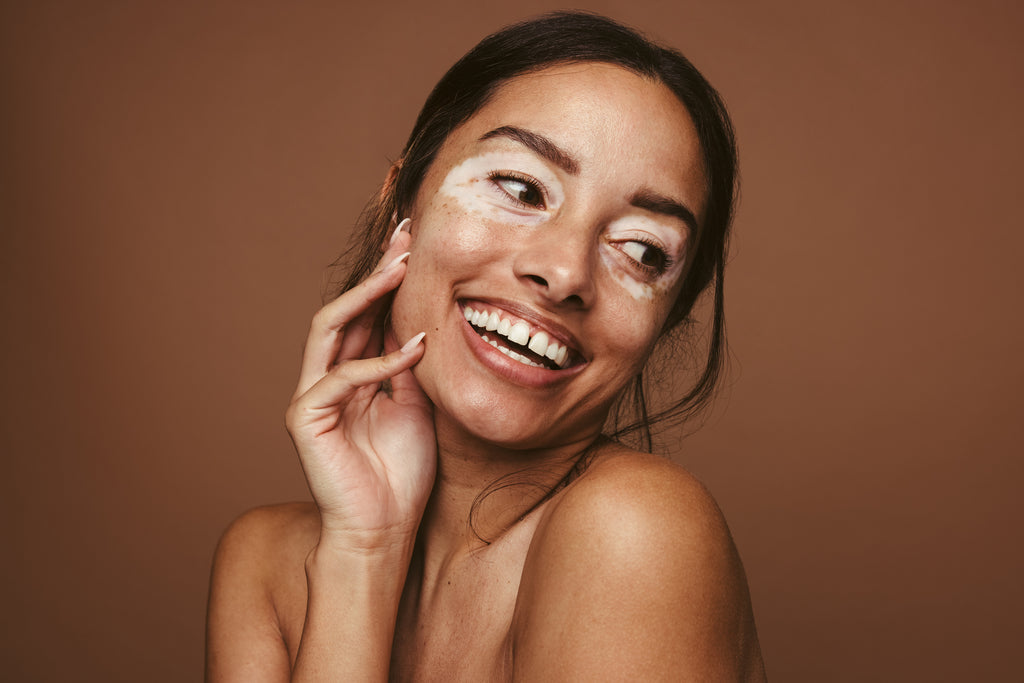
Whether it's sunspots, scars, or patchy freckles, we know how those dark patches of skin pigmentation can really get in the way of your skincare goals.
Hyperpigmentation can appear on your skin in many forms, and although it's a generally harmless blemish, it can knock your confidence and even add years to your complexion.
So where exactly does this pigmentation come from, and what can we do about it? In this article, we'll cover everything you need to know about hyperpigmentation, what causes it, and how to treat it with the best skin care products.
What Is Hyperpigmentation?
Hyperpigmentation is a term we use to describe dark spots or blotchy patches of skin. This happens when the skin cells that produce pigment (melanocytes) produce excess melanin (a dark brown pigment that's also responsible for tanning).
Hyperpigmentation can range from small spots and freckles to large areas of your body. It is generally not dangerous, but changes in skin color can indicate other health conditions that may need treating, and it's a cosmetic concern that can affect your confidence.
Types of Hyperpigmentation
Hyperpigmentation is a catch-all term for the excess pigment in your skin, but there are a few different types of hyperpigmentation out there. The main and most common types of hyperpigmentation are:
Hormonal Melasma
This type of hyperpigmentation is caused by your hormones, which may fluctuate for various reasons that we will explain below. Hormonal changes, particularly changes in estrogen and progesterone, can affect your melanocytes and trigger those pigment-producing cells to go into overdrive. Hormonal melasma most commonly appears as pigmentation on the face.
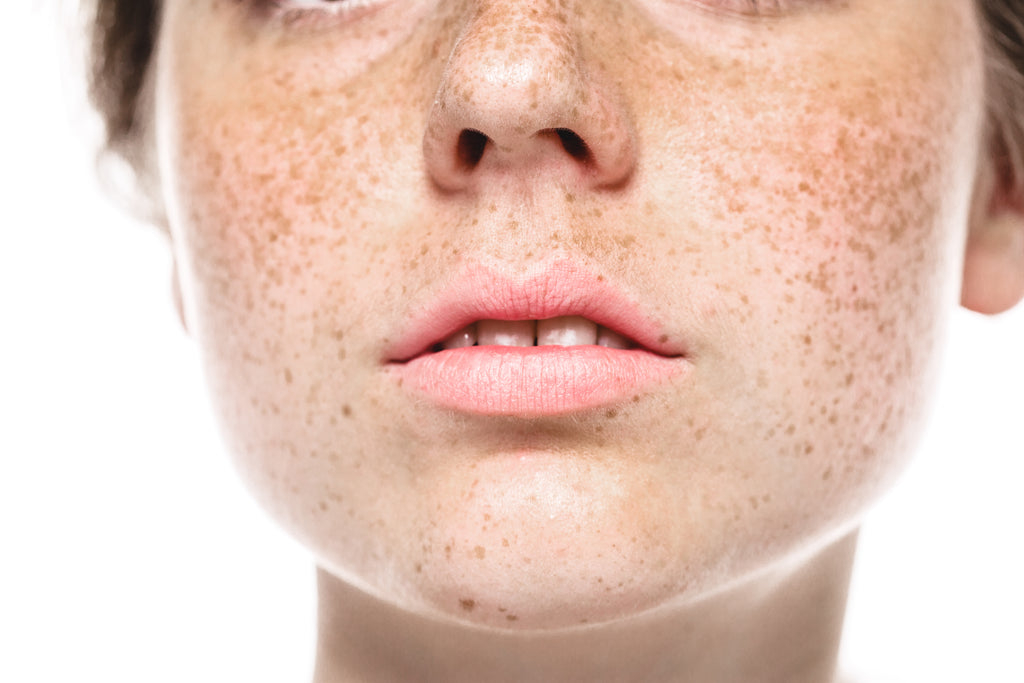
What is the feel good hormone? RenewSkin Inc. investigates.
Sun Spots
Sun spots, which may also be referred to as liver spots, age spots, or solar lentigines, are a form of hyperpigmentation that shows up as concentrated dark spots on your skin. Despite often being called liver spots, these patches of pigment have nothing to do with your liver, they are caused by excess sun exposure.
These are small, flat brown patches that most commonly affect the hands, face, shoulders, and arms – basically anywhere that is most exposed to the sun.
Post-Inflammatory Hyperpigmentation
This type of hyperpigmentation is caused by inflammation, and it shows up as dark marks that have been left behind after skin injuries.
Post-inflammatory hyperpigmentation occurs on any part of your skin that has been cut, scraped, or wounded in some way. It can appear as pink, red, brown, or black patches of skin.
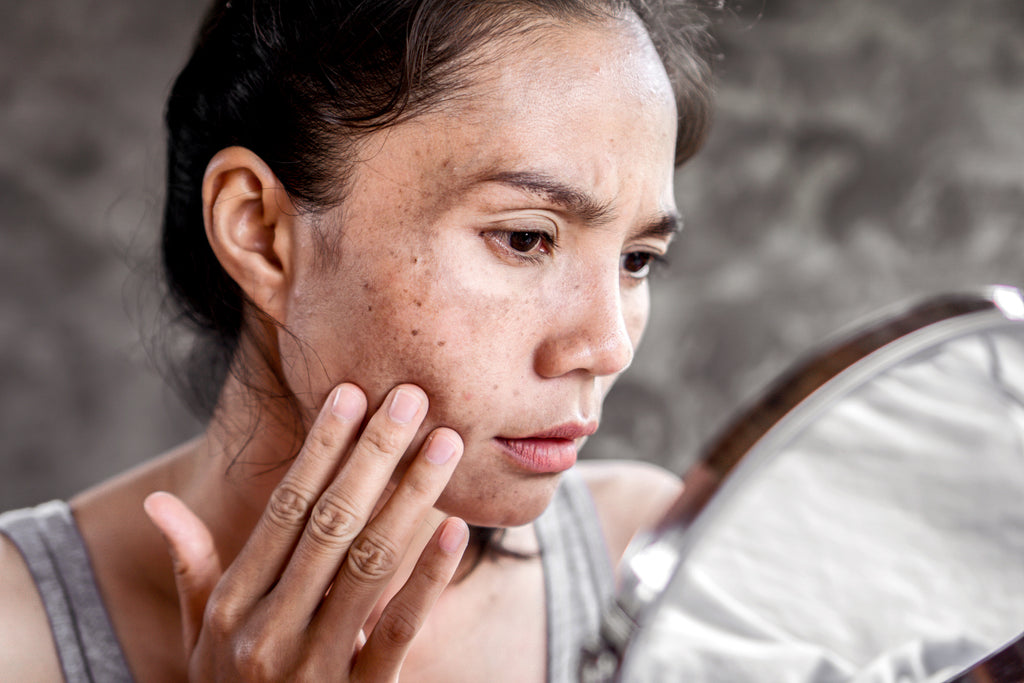
What Causes Excess Melanin Production?
Let's dive a little deeper into why hyperpigmentation happens! Here are the top causes of those pesky dark spots:
Sun Exposure
The main thing that triggers a surge of melanin in your skin is, of course, exposure to the sun.
Those who love to sunbathe will know that sunlight on your skin will trigger melanin production, which gives you that enviable bronze glow! However, what may appear as a gorgeous golden tan now can impact your skin in negative ways as time goes by, because UV rays trigger oxidative stress and other reactions in your body which can be very harmful to your skin's structure and strength.
Consistent exposure to UV rays can lead to an array of problems, ranging from cosmetic issues like age spots to more sinister diseases like skin cancer. Although you'll initially just see a tan or possibly a sunburn after a day in the sun, over time the melanin in your skin can build up to persistent and unsightly age spots as you get older. Later in life, sunbathing addicts will also likely have much more uneven, pigmented, and leathery skin than those who protect themselves properly.
How does the sun damage skin? RenewSkin Inc. explains.
Hormonal Changes
Hormonal melasma is a common form of hyperpigmentation that is caused by hormonal changes, particularly by fluctuating levels of estrogen and progesterone. These hormones can make your skin more susceptible to sun damage, which can cause patches of pigmentation and darkened skin to appear, especially on your face.
The surge of estrogen and progesterone during pregnancy will often trigger excess production of melanin for pregnant women. In fact, pigmentation is so common for pregnant women that melasma is often referred to as the "mask of pregnancy". 1
The hormonal effects of birth control pills or hormone replacement therapy (HRT) can have a similar effect.
Inflammation
If you've ever suffered from acne in your lifetime, you're probably all-too-familiar with the pesky acne scars it can leave behind! This is a form of skin pigmentation caused by inflammation, which can leave unsightly marks on your complexion.
It's not only acne that leads to inflamed skin and pigmentation, either. Post-inflammatory hyperpigmentation can also occur with other inflammatory skin conditions like psoriasis, or after any trauma to the skin, such as an insect bite, cut, scrape, or burn.
Skin Color
According to the American Academy of Dermatology, people with naturally darker skin tones are more likely to get melasma. 2
This happens because people with naturally darker skin tones have more melanocytes in their bodies than people with light skin do, which naturally increases the chance of hyperpigmentation occurring.
Certain Medications
There are certain medications that can increase melanin production in your body. These include hormone-affecting medications like birth control pills, as we mentioned earlier. Other medications such as chemotherapy drugs, can increase your skin's sensitivity to UV damage and leave behind darkened patches of skin.
Other examples of medications that can increase your sensitivity to sunlight when used over extended periods of time include antibiotics, antifungal medications, antihistamines, non-steroidal anti-inflammatories, and cholesterol-reducing drugs. 3
Endocrine Disorders
An endocrine disorder is any health condition that affects your endocrine system, which is the system that controls your hormones. The endocrine system relies on glands throughout the body to make and release hormones, as and when they are needed.
Among these conditions are diabetes, PCOS, hyperthyroidism, hypothyroidism, and Addison's disease. Because your hormone levels can significantly impact your melanocytes and cause pigmentation, these conditions can be linked to hyperpigmented skin.
Most notably, Addison's disease is a rare endocrine disorder that causes significant hyperpigmentation on the face, neck, hands, elbows, and knees.

7 Ways to Help Fade Hyperpigmentation
No matter the cause, hyperpigmentation can be extremely frustrating and it can really knock your confidence! Luckily, there are things you can do to fade hyperpigmentation and get a smooth, even skin tone back. Here are our expert tips for beating hyperpigmentation:
1. Prescription Medication
If you struggle with persistent pigmentation issues, it's best to consult with a dermatologist who can check your medical history, rule out dangerous conditions, and provide medical advice and diagnosis.
Your dermatologist can also prescribe certain prescription medications to help fade darkened skin, which most commonly will be a topical cream containing hydroquinone.
Hydroquinone is an ingredient often used in skin lightening and whitening creams, and it can be a short-term solution to hyperpigmentation. However, it's not the best treatment out there, because prolonged use of hydroquinone can actually darken your skin over time. Due to its substantial absorption rate into the bloodstream, experts also advise against it during pregnancy and breastfeeding – not an ideal solution for the "mask of pregnancy"!
So it's important to only use hydroquinone in close consultation with your dermatologist, who will provide medical advice and ensure you avoid any adverse effects. Luckily, there are also some more natural solutions out there!
2. Antioxidants: Say Goodbye to Dark Spots With Taut Bright!
As we have said, there are better and more natural alternatives out there that can lighten your complexion, without nasty chemical ingredients! Antioxidants are natural ingredients that combat oxidative stress in your body, and they can help brighten your complexion, even your skin tone, and fade dark spots naturally.
Even better, science backs these ingredients too. Recent studies have concluded that antioxidants are very effective as topical treatments for hyperpigmentation. 4, 5
Taut Bright is an antioxidant supplement specifically designed to reduce hyperpigmentation and treat darkened skin, going one step further than topical treatments to treat your entire body from within.
Our formula contains 7 antioxidants and active ingredients proven by science to help protect against cellular damage, inhibit the production of melanin, fade hyperpigmentation and age spots, and lighten your skin naturally.
Antioxidants can help naturally protect against harmful UV rays, neutralize harmful free radicals in the body, and reduce dangerous inflammation. Taut Bright's primary ingredient glutathione has been described as “the mother of all antioxidants,” giving you the very best protection there is.
Designed to brighten and illuminate your complexion, Taut Bright treats the root of your pigmentation problems by inhibiting the production of melanin. A daily dose of this skin-brightening supplement can help reduce and fade unwanted dark spots on your face and your body, giving you a naturally light and luminous complexion!
What's the best skin lightening treatment? RenewSkin Inc. investigates.
3. Retinoids
You've probably heard of retinol, a gold standard ingredient in the skincare world. Retinol belongs to a family of ingredients known as retinoids, which are vitamin A derivatives that help speed up skin cell turnover.
What can retinoids do for hyperpigmentation, you may ask? Well, these ingredients are most loved by skincare addicts for their ability to speed up cell turnover and thicken skin, which has an amazing wrinkle-reducing impact but also helps reduce the appearance of pigmentation over time.
Even better, retinoids can also help inhibit tyrosinase, an enzyme that speeds up the production of melanin. 6
You can try at-home retinol serums or ask your dermatologist about stronger prescription retinoid formulas. Topical retinoids might not fully remove hyperpigmentation, but they can reduce it significantly. However, if you have a sensitive skin type, be warned that retinoids can be very harsh and may not be suitable for you.
4. Vitamin C
Whether it's for a hormonal melasma treatment or an inflammation-busting skincare routine, vitamin C is one of our absolute favorite ingredients. Vitamin C is one of the most effective ingredients in topical skincare for creating an even skin tone, reducing redness, and beating pigmentation.
Taut Collagen Mask is our luxurious face mask infused with vitamin C, marine collagen peptides, hyaluronic acid, and botanical squalene – a triple-action formula that hydrates, repairs, and protects your complexion.
The combination of collagen peptides with vitamin C is a real winner when it comes to healing and smoothing your skin. Collagen helps speed up wound healing, while vitamin C repairs, protects, and brightens your complexion. This is the perfect way to stave away those pesky acne scars, reduce melasma, or fade age spots, rejuvenating your skin for red-carpet radiance in just 15 minutes!
5. Exfoliating Acids
By exfoliating regularly, you can avoid the build-up of dead skin and help speed up the rate at which your skin repairs and replenishes itself – which in turn helps fade scars and dark marks. Exfoliating acids, which you'll see on skincare labels as AHAs (alpha-hydroxy acids) and BHAs (beta-hydroxy acids), are the most effective yet gentle way to do this.
Acids like glycolic acid, azelaic acid, and kojic acid are great ingredients to include in your skincare routine, in exfoliating toners, serums, masks, or face scrubs. You'll likely find these acids in varying concentrations (2-10%) alongside other brightening ingredients like vitamins or green tea extracts.
You can also opt for stronger exfoliating treatments at your dermatologist's office in the form of chemical peels, which will offer more significant improvements for highly pigmented or uneven skin.
6. Laser Therapy
Speaking of cosmetic procedures at your dermatologist's office, you could also consider laser therapy if you are struggling with persistent hyperpigmentation issues. Laser resurfacing treatments use a laser to heat your dermis and stimulate the growth of collagen, which helps newer, tighter, smoother skin to form.
Because laser resurfacing promotes the growth of new collagen, it can help fade pigmentation and scarring, reduce fine lines and wrinkles, and tighten your skin for a more youthful complexion.
7. Microdermabrasion
Last but not least, microdermabrasion is another in-office treatment you can try to help fade unwanted pigmentation. Microdermabrasion is an exfoliating procedure in which your dermatologist will remove the outer layer of your skin with a special abrasive tool, revealing fresher and more radiant skin below. Microdermabrasion is helpful for fading hyperpigmentation, scars, and stretch marks.
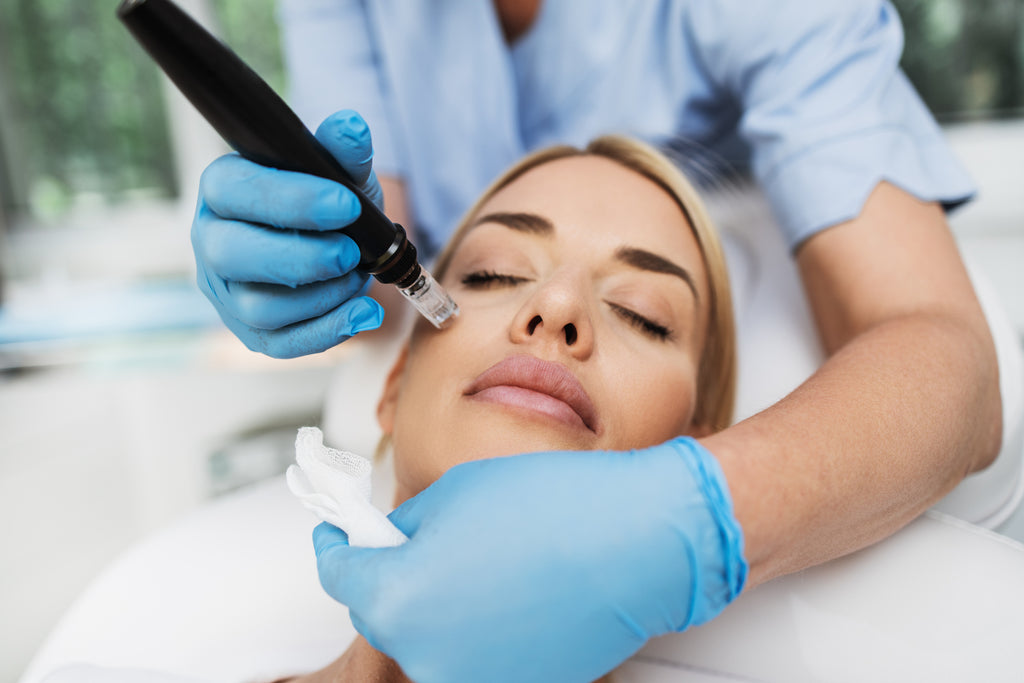
Prevention Is Key: Protect Your Skin From The Sun
Although all of the above treatments are helpful and effective ways to treat hyperpigmentation, it's always true that prevention is better than cure!
To prevent hyperpigmentation, the best thing you can do is protect your skin from harmful UV rays on a daily basis – rain, hail, or shine! That means wearing sun protection every day, avoiding excessive sun exposure, and wearing protective clothing when necessary.
When choosing a sunscreen, check that it is broad-spectrum (translation: protects against both UVA and UVB radiation) and it has an SPF of 30 or higher. A mineral sunscreen containing zinc oxide is the most effective choice for those who struggle with hyperpigmentation.
If you are particularly sensitive to sunlight, you could also try SPF-infused clothing.
Treating Hyperpigmentation: Why Collagen Matters
Collagen is the main and most important protein in your skin, it keeps your dermis strong and resilient. Sun exposure subjects your skin cells to damage, which slows down your body's natural production of collagen and weakens your skin's foundational structure. This leaves your skin more susceptible to pigmentation issues like sun spots or age spots.
Collagen is also key to the wound healing process, so having a healthy supply of this protein is essential to avoiding post-inflammatory hyperpigmentation issues like acne scars or burn marks.
Taking a collagen supplement can help speed up wound healing, reduce inflammation, and strengthen your skin from within – both preventing pigmentation issues and fading existing marks and spots.
Ms. Magnifique is our tailor-made transformation program recommended for anyone struggling with hyperpigmentation. It contains a three-week supply of our top three products:
- Taut Liquid Collagen – 24 bottles of our signature liquid collagen supplement, which contains hydrolyzed marine collagen peptides along with 6 active ingredients that hydrate, strengthen, and repair your skin: elastin, hyaluronic acid, grape seed extract, vitamin C, ceramide, and vitamin B6.
- Taut Bright – our natural, safe, and nutrient-rich supplement that slows down melanin production and brightens your complexion from within.
- Taut Collagen Mask – the luxurious 15-minute sheet mask that infuses your skin with collagen and vitamin C, with serious radiance-boosting, skin-plumping effects!
By using these three products over the course of three weeks, you can give your skin the strength it needs to replenish and repair from the inside out and the outside in. So you can say goodbye to dark spots and pigmentation, and hello to radiant, bright skin!
Want to see how Taut really works? Read our reviews and check out real customer before & after photos here.
References:
- https://medlineplus.gov/ency/article/000836.htm
- https://www.aad.org/public/diseases/a-z/melasma-causes
- https://www.fda.gov/drugs/special-features/sun-and-your-medicine
- https://pubmed.ncbi.nlm.nih.gov/33151621/
- https://www.mdpi.com/2076-3921/8/9/332/htm
- https://jddonline.com/articles/topical-retinoids-for-pigmented-skin-S1545961611P0483X/




